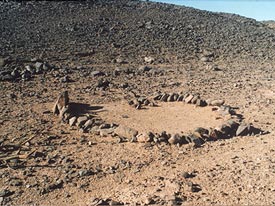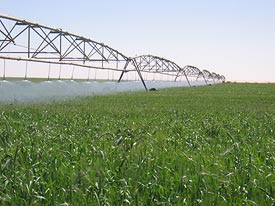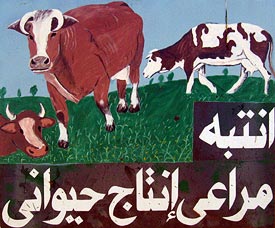



Top: Wadi In Erahar, left by the nomads in 1969
Middle and bottom: new farm in the Wadi Berjuj
Middle and bottom: new farm in the Wadi Berjuj
The valley is changing and blooming after the 1969 Revolution. After centuries of barrenness with just a few wild-pear trees. My mother carried in her all the love for the old valley; the desappearance of a wild tree made her sad. When the new farmers moved in and changed the face of the valley it filled her with fear. The divorce of a newly rich man from his aged wife is a disaster that is a topic of conversation for months.
The valley has changed with agricultural reforms. The valley has changed its skin; the old people become older, and more and more puzzled every day; what has appened to the valley? The old men and old women stare silently at the tractors that are clearing land for the new farms. They are chewing-over their old memories of life in the past.
My mother does not know that life is a mill going round and round, non-stop. She does not unterstand that the past is not necessarily glorious or attractive. She does not understand that the schools which are taking the place of mounds of sand and weeds will teach the children the alphabet of a right life. My mother does not understand that the valley will become schools; dams of water, and a green landscape. My mother does not understand; she has aged, and sees the past as beautiful and lives it.
* * *
She awaited my homecoming from Munich every year, where I settled for ten years. The thing that makes me come back to my homeland is a great love; this great love is the strands of feelings which enable me to breathe; and my mother is their embodiment.
The grave of my father is the bell that rings in my heart and head when my absence from my country becomes too long. I told the owner of the restaurant in Munich, Herr Geisler, that my mother was calling me to return to my country and recite a Sûrah of the Qur-an over my father‘s grave.
So Herr Geisler left the restaurant and came back with a return air-ticket to Tripoli and he said, „ Go to the mother and to the valley and to the graveyard of your father and come back to us, my son.“
I love my country and this love is the umbilical cord that feeds me with life; but what can I give to my country if I go back? I am thirty-five years old and can do nothing but prepare German meals. I am basically weak, with sensitive feelings. And the cemetry of strangers in Munich will be my resting place as I am only a green branch from a dying tree; that dying tree is my mother.
So soon I fly back like a winter bird to my mother, to the valley, to the graveyard of my father. Eventually I go back to Munich.
To love your country from afar is something mysterious. There is something sacred in this love, so I have become an addict by choice, spending my evenings playing the lute, reading books, and searching for my country‘s voice upon the radio.
* * *
My mother became sick, I returned to the valley from Munich; after two days she died on the same carpet she wove decades ago, before she was married to my father; on the same carpet my father died and on the same carpet I was born. The neighbours carried her to the graveyard at the top of a hill. I cried for a long time; I read Sûrah of the Qur-an for the penultimate branch of my family tree. I felt my return ticket to Munich in my pocket and I walked down the hill by myself feeling that my feet were glued to the ground.
From „The King of the Dead an other Libyan tales“, Tripolis 1982.
